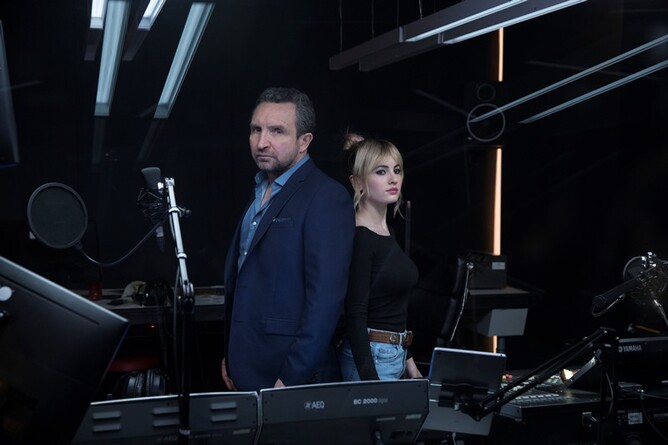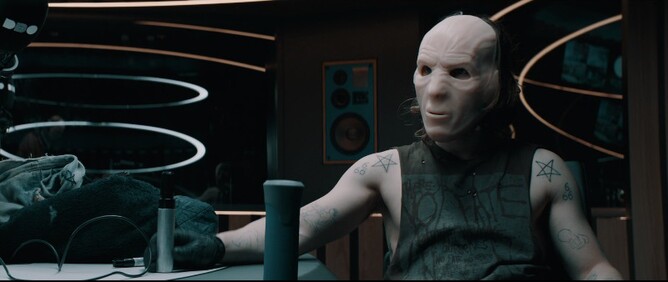FEEDBACK
Written by Pedro C Alonso and Alberto Marini
Directed by Pedro C Alonso
Jarvis Dolan is a popular, but notorious talk radio show host. He’s championed for being the foe of the right wing and the bigots a la LBC’s James O’Brien. His job does come at considerable cost to his welfare. You join him as he’s returning to the mic after surviving a kidnapping and his car being torched. Jarvis, played by Eddie Marson is dead behind the eyes in terms of fear – he has a calling and no scare tactics are going to stop him outing the bad guys on air. His equally ruthless boss is forcing him to have an old radio co-host, the leather-jacketed, aptly named Andrew Wilde, guest with him on the show – be like the good old days when the pair of shot to fame. Jarvis accepts the imposition through gritted teeth. However, the nostalgia trip takes a dark detour when the studio is hijacked by a couple of masked assailants armed with a sledgehammer and a shotgun.
They want Jarvis to be the radio show puppet or the producer dies. As the self-appointed, self-righteous man of the people he point blank refuses until his has no choice. He is eventually joined by Andrew Wilde, played with a hard Mancunian twang by Peaky Blinders Paul Anderson. Is he in on it? It’s soon clear he is not and the descent into the macabre secrets the pair of them share begins. The masked men prompt Jarvis with questions to ask Andrew about what happened in Belfast in 2011. Andrew doesn’t understand why Jarvis would be so cruel as to go there live on the radio. “I’m your mate. We’re supposed to be mates … We buried that shit,” he bemoans. The emotional and physical torture ramps up and the story of that fateful night of excess, rape and murder is told on air.
FEEDBACK’s first ports of call are places you’d expect dealing with the consequences of such revelations would go. Director Pedro C Alonso presents us with two pathetic, tearful, regretful middle-aged white men confessing the forgotten sins of their not too distant past. They’re found out, telling all and no smart arse quip or skip to the next caller can end the nightmare for them. The relationship of broadcaster and audience, which Jarvis once held dominion, is now in chaotic tatters. He’s being told what to say and what to think. What’s surprising is where Alonso decides to let the moral values of the film land after the take down and humiliation of the exploitative celebrities is in full swing.
There’s a line, midway through the ordeal that alludes to how much the likes of Jarvis know how to play the game. He whispers to Andrew it doesn’t matter what they say if they’re forced to say it. It’s a throwaway moment but it’s where FEEDBACK pivots and slowly begins to unveil a version of the world we know well. A media landscape where facts and truth have been outgunned by the singular desire of being popular – no matter how abhorrent the message. Where an ability to agitate is rewarded with more lucrative offers from rival stations willing to take the liberal flack for all the eyeballs and ears the irresponsible person brings to their channel. Jarvis pays a huge personal price for his alleged past actions, in terms of the relationship with his teenage daughter, but his status as a high profile radio jock only grows. FEEDBACK is a wonderfully told pessimistic tale that says there is no escape from the moral maze. There just is a moral maze to endlessly run around in.




